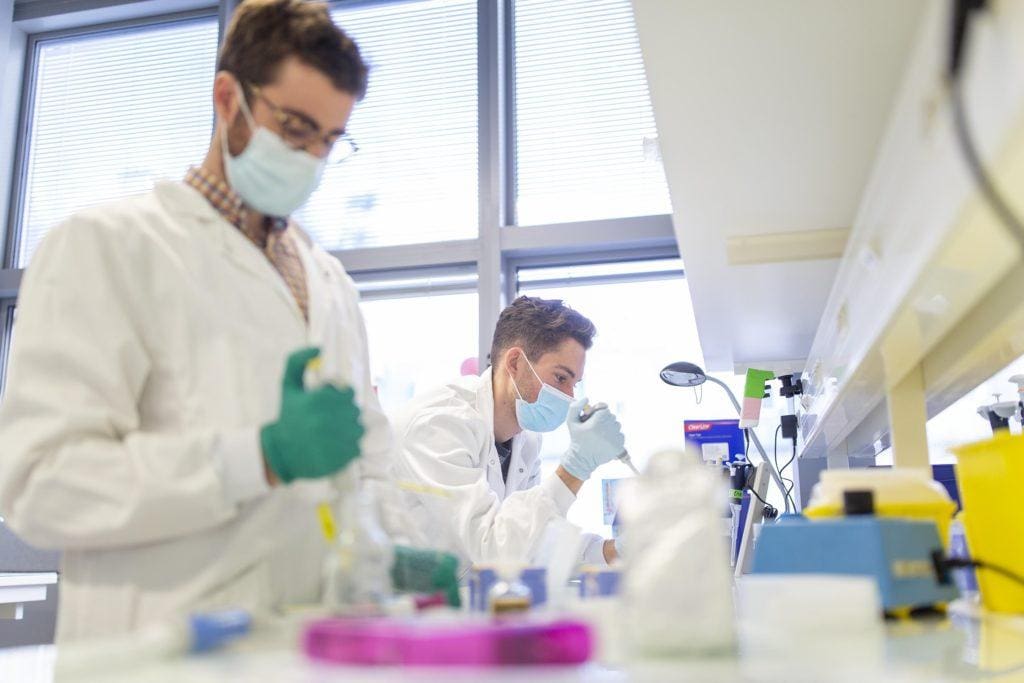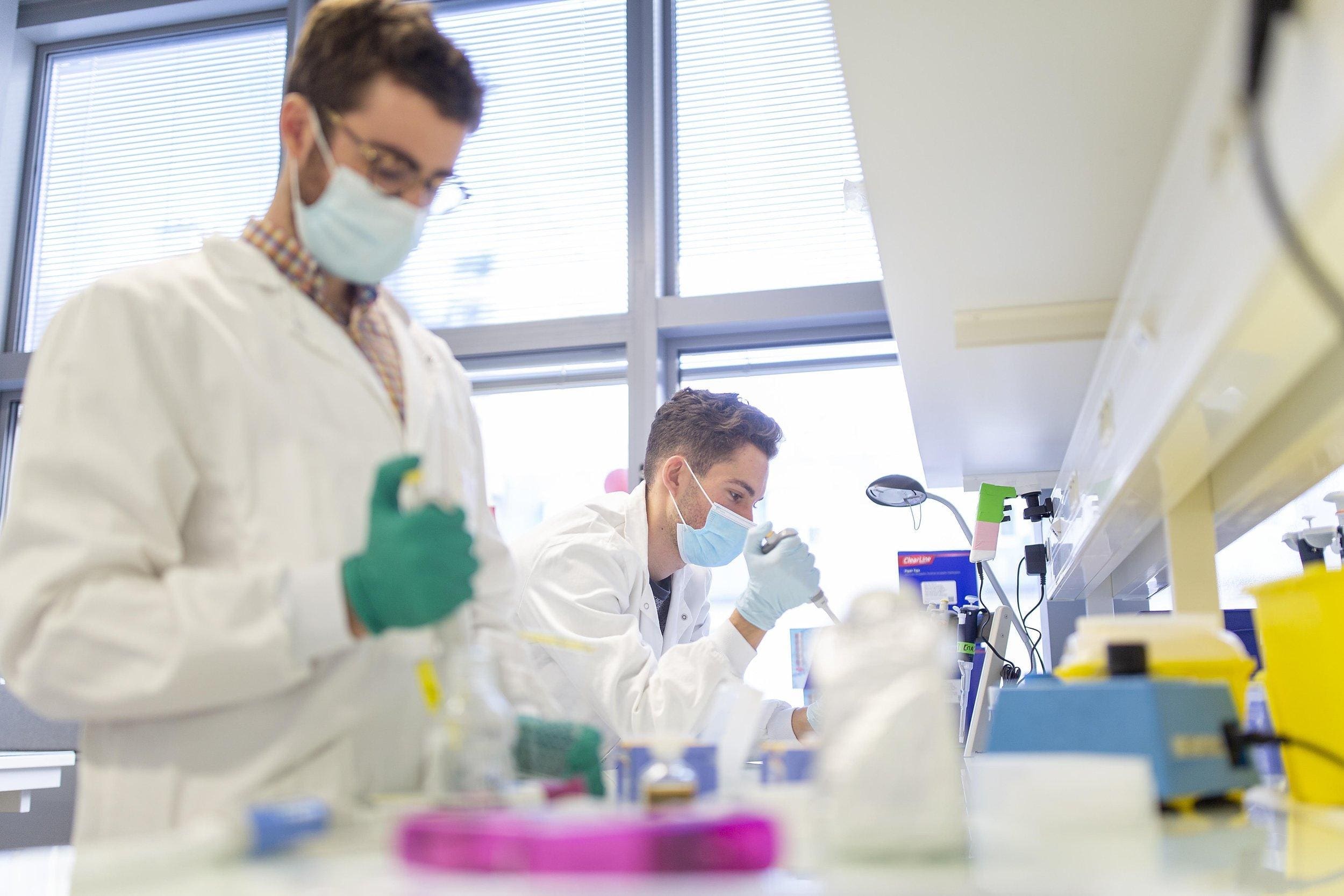For the International Day of Immunology, we highlight the important work of early-career immunologists with the Michelson Prize.

Dr. Paul Bastard working in his lab. Photo credit: Looping.
By Justin Chapman
As Michelson Philanthropies’ Co-chair, Dr. Gary K. Michelson often says, understanding the human immune system is critical to preventing and combating almost all diseases. Today is the International Day of Immunology, a global celebration of immunology and an opportunity to educate the general public about the important role immunologists play.
“As we reflect on the lessons of the pandemic, we must renew our commitment to scientific research,” U.S. Senator Alex Padilla of California said. “It’s critical to invest in early-career investigators who are laying the groundwork in preparing for future pandemics or curing diseases that affect millions.”
In February, Michelson Philanthropies and the American Association for the Advancement of Science (AAAS) awarded one of those immunologists, Dr. Paul Bastard of the Imagine Institute and the Necker Hospital for Sick Children’s Department of Pediatrics in Paris, with the inaugural Michelson Philanthropies & Science Prize for Immunology, a $30,000 prize for transformative research in human immunology with trans-disease applications to accelerate vaccine and immunotherapeutic discovery. Two finalists, Dr. Scott Biering of UC Berkeley and Dr. Lisa Wagar of UC Irvine, each received $10,000 prizes.
The three recipients were selected through a global competition for the transformative and impactful nature of their research to accelerate vaccine development and immunotherapeutic discovery. They presented their groundbreaking work to understand and combat emerging infectious disease threats in a recent virtual award ceremony called “Charting the Future of Immunology and Immunotherapy,” co-hosted by Michelson Philanthropies, Science/AAAS, and Keystone Symposia.
Watch the full ceremony below:
“These rising stars in the field of immunology are setting the stage for better pandemic preparedness in the future,” said Shannon Weiman, scientific communications manager for Keystone Symposia and host of the ceremony.
“We’re all aware of just how difficult it is for young scientists to get funded to do their own research and for scientists in general to get funding to do out-of-the-box, high-risk, but potentially high-return research,” Dr. Michelson said, adding that one of the purposes of these awards is to shine a light on those problems as well as to recognize the brilliance and imagination of these young scientists. “If history holds, the best purpose will be that these awards will alter and accelerate the trajectories of their careers.”
“This partnership with Michelson Philanthropies is one way for us to give back to the scientific community and try to recognize some of the issues and concerns over traditional funding in this area for early-career researchers.”
—Dr. Bill Moran, publisher of Science
“Our mantra at AAAS is ‘advancing science and serving society,’ and this is one way we achieve that mission,” said Dr. Bill Moran, publisher of the Science family of journals. “This partnership with Michelson Philanthropies is one way for us to give back to the scientific community and try to recognize some of the issues and concerns over traditional funding in this area for early-career researchers.”
Senator Padilla added that more must be done to support women and people of color in the scientific community.
“Diversity in the research environment drives new discoveries,” he said. “The rising stars we celebrate today are tackling urgent questions in immunology and vaccine development that will shape the future.”
Dr. Holden Thorp, editor-in-chief of the Science family of journals, added that it was “a very exciting day for science” and for their magazines. “It’s such a privilege to work with someone like Dr. Michelson who is a great scientist in his own right, understands so much about research and how it’s done, values enhancing the careers of young scientists and has such a focus on one of the most important frontiers in science and that is in immunology.”
As part of his research, Dr. Bastard created a consortium called the COVID Human Genetic Effort (CHGE) to recruit and test as many patients as possible with either severe disease or very mild disease and then to compare both genetic mutations. Dr. Bastard, who does his research in Jean-Laurent Casanova’s laboratory at the Imagine Institute in Paris, has set out to find answers to why people die of COVID-19 by focusing on the genetic and immunological determinants of severe viral diseases, including the causes and consequences of autoantibodies against type I interferons.
Dr. Biering is a molecular virologist and immunologist at UC Berkeley School of Public Health’s Division of Infectious Diseases & Vaccinology. His research investigates the role of viral proteins like flavivirus nonstructural protein 1 (NS1) and SARS-CoV-2 spike in inducing viral pathogenesis and promoting viral dissemination. For the Michelson Prize, he wrote about a conserved flavivirus protein that holds potential as a target for versatile vaccines and therapies.
Dr. Wagar’s research focuses on translational human immunology and the use of organoids to understand the complex interactions that occur between immune cells upon vaccination and infection in humans. For the Michelson Prize, she wrote about deciphering immune responses to viruses and vaccines using human tonsil organoids. Originally from Canada, Dr. Wagar received her Ph.D. from the University of Toronto and has long been interested in human immunology. She is an assistant professor at UC Irvine, where she started her lab in 2020 in the Department of Physiology and Biophysics.
Learn more about the Michelson Philanthropies & Science Prize for Immunology.

